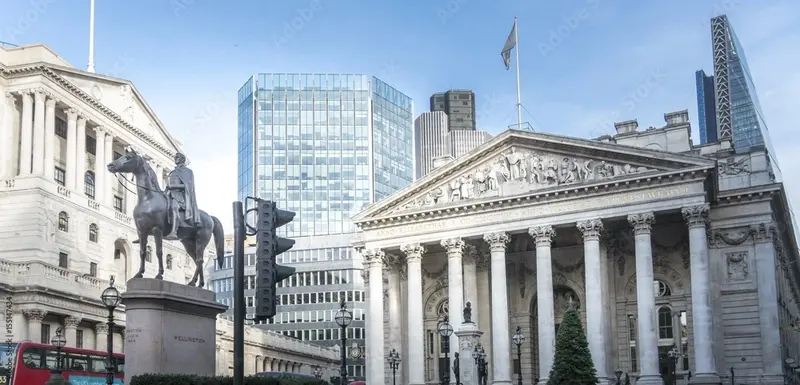
European markets rose on Thursday morning after the US Federal Reserve decided against a change in interest rates, with the FTSE 100 up ahead of the Bank of England’s interest rate decision.
The FTSE 100 index opened up 91.13 points, 1.2%, at 7,433.56. The FTSE 250 was up 346.79 points, 2.0%, at 17,532.68 and the AIM All-Share was up 3.58 points, 0.5%, at 687.15.
The Cboe UK 100 was up 1.3% at 741.74, the Cboe UK 250 was up 2.1% at 15,281.06, and the Cboe Small Companies was up 0.4% at 12,669.82.
In European equities, the CAC 40 in Paris was 1.2%, while the DAX 40 in Frankfurt was up 1.1%.
The BoE will announce its interest rate call at midday when it is expected to enact a second-successive pause and reiterate its ‘data dependent’ outlook.
The UK central bank decided against a hike in its September meeting, maintaining bank rate at 5.25%, which is a more than 15-year high.
The dollar retreated following the interest rate announcement from the Federal Reserve, with the central bank leaving rates unchanged.
Fed Chair Jerome Powell said the bank remains ‘strongly committed’ and ‘squarely focused’ on getting inflation back to its 2% target, leaving the door ajar for a further interest rate increase.
He cautioned against reading too much into the idea that they are on an extended pause, saying no decision on what they will do at the December meeting has been made. Powell said the Fed had come ‘very far’ in this rate-hiking cycle and would take meetings ‘one-by-one’ and look at the data.
Sterling was quoted at $1.2159 early Thursday, higher than $1.2123 at the London equities close on Wednesday. The euro traded at $1.0593, higher than $1.0537. Against the yen, the dollar was quoted at JP¥1.5041, down versus JP¥151.07.
In addition to central banks, there was also a slew of UK company updates for investors to digest.
In the FTSE 100, BT Group was the top performer, up 5.4%.
In the half year to September 30, the telecommunications firm said revenue came in broadly flat year-on-year, edging up to £10.41 billion from £10.37 billion, but pretax profit jumped 29% to £1.08 billion from £831 million.
‘Our delivery in the first half means we are confirming our financial outlook for FY24 with normalised free cash flow now expected towards the top end of the guidance range,’ said CEO Philip Jansen.
Sainsbury’s rose 4.5%
The grocer expects underlying pretax profit to come in at the upper range of its guidance of £670 million and £700 million for its financial year, reporting ‘strong volume and market share growth’ in its first half.
In the 28 weeks ended September 16, the grocer’s group sales including value-added tax rose 2.9% annually to £18.67 billion from £18.34 billion. However, excluding fuel, they rose 7.7% to £15.81 billion from £14.67 billion. Pretax profit fell 27% to £275 million from £376 million, but was flat at £340 million on an underlying basis.
Meanwhile, Entain fell 4.5%. The sports betting and gaming firm said net gaming revenue grew 7% in its third quarter. However, it said ‘continued customer friendly results’ in October hit its sports margins.
Oil major Shell added 2.0% as it managed to avoid the fate that befell rival BP earlier in the week as its earnings for the third quarter stayed largely in line with expectations.
The London-listed oil and gas producer said its adjusted earnings fell 34% in the three months compared with a year earlier, landing at a little over $6.2 billion.
The result was only $24 million behind expectations, unlike BP which missed its forecast underlying replacement cost profit by around $700 million.
In the FTSE 250, Trainline reported a strong first half, sending its shares up 8.4%.
Net ticket sales jumped 23% to £2.65 billion in the six months ended August 31, from £2.16 billion a year before, with revenue rising 19% to £197 million from £165 million. Pretax profit rose to £18.1 million from £13.6 million.
Trainline said passenger numbers have almost fully recovered from the Covid-19 pandemic, and it expects growth to continue into the second half, despite headwinds from industrial action and broader macroeconomic uncertainty.
It now expects revenue growth in its full year to be between 15% and 20%, compared to its previous range of 13% and 22%.
In the US on Wednesday, Wall Street ended higher, with the Dow Jones Industrial Average up 0.7%, the S&P 500 up 1.1% and the Nasdaq Composite up 0.9%.
In Asia on Thursday, the Nikkei 225 index in Tokyo closed up 1.1%.
Japanese Prime Minister Fumio Kishida announced a stimulus package worth more than $100 billion as he tries to ease the squeeze from inflation and rescue his premiership with his poll ratings at a record low.
‘We are seeing that the tide is turning from the vicious cycle of deflation – symbolised by low prices, low wages and low growth,’ Kishida told a meeting where he revealed the size of the package would be around JP¥17 trillion, or $113.2 billion.
The plan involves income and residential tax reductions, and cash handouts to low-income households, according to public broadcaster NHK and other local media. Fuel subsidies will also be extended, and there will be funds to promote investment in high-tech areas including the chip and space industries.
In China, the Shanghai Composite closed down 0.5%, while the Hang Seng index in Hong Kong closed up 0.8%. The S&P/ASX 200 in Sydney closed up 0.9%.
Gold was quoted at $1,985.30 an ounce early Thursday, higher than $1,978.93 on Wednesday. Brent oil was trading at $85.63 a barrel, lower than $86.36.
Thursday’s global economic calendar sees the UK interest rate decision at 1200 GMT and the US unemployment insurance weekly claims report at 1330 GMT.
Copyright 2023 Alliance News Ltd. All Rights Reserved.




